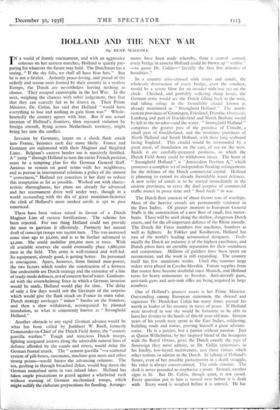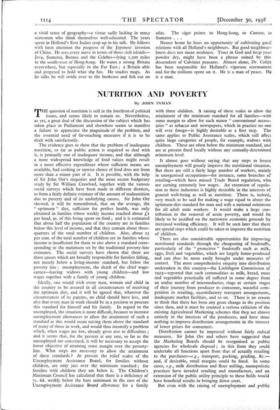HOLLAND AND THE NEXT WAR
By RENE MACCOLL
TN a world of frantic rearmament, and with an aggressive colossus on her eastern marches, Holland is quietly pre- paring for whatever the future may hold. The Dutchman has a saying, "If the sky falls, we shall all have blue hats." But he is not a fatalist. Ardently peace-loving, and proud of the orderly and serene oasis formed by their country in a restless Europe, the Dutch are nevertheless leaving nothing to chance. They escaped catastrophe in the last War. In the next, weighing the chances with sober judgement, they fear that they can scarcely fail to be drawn in. Their Prime Minister, Dr. Colijn, has said that Holland "would have everything to lose and nothing to gain from war." Whole- heartedly the country agrees with him. But if not actual invasion of Holland's frontiers, then repeated violation by foreign aircraft, flying across Netherlands territory, might bring her into the conflict.
Invasion by Germany, intent on a shock flank attack into France, becomes each day more likely. France and Germany are stalemated with their Maginot and Siegfried Lines. Belgium's eastern border too is massively fortified. A" jump "through Holland to turn the entire French position. must be a tempting plan for the German General Staff. Anxious to remain on good terms with her neighbours, and to pursue in international relations a policy of the utmost "correctness," Holland yet conceives it her duty to reduce ibis temptation as far as possible. Worked out with charac- teristic thoroughness, her plans are already far advanced and her rearmament drive well under way, though in a world resounding with the din of giant munition-factories the clink of Holland's more modest anvils is apt to pass unnoticed.
There have been voices raised in favour of a Dutch Maginot Line of eastern fortifications. The scheme has been rejected. For one thing Holland could not provide the men to garrison it effectively. Formerly her annual draft of conscript troops was to,000 men. This was increased some time ago to 32,000, and is to be further advanced to 42,000. She could mobilise soo,000 men at once. With all available reserves she could eventually place 1,68o,000 men in the field. This army is well-trained and well-led. Its equipment, already good, is getting better. Its personnel is courageous. Apart, however, from limited man-power, the two factors which render the construction of a fortress line undesirable are Dutch strategy and the existence of a line of ready-made defences, not of concrete but of water. Confront- ed with the overwhelming force in which a German invasion would be made, Holland would play for time. The delay of only a few days would rob the Germans of the surprise which would give the flank attack on France its main value. Dutch strategy envisages " minor " battles on the frontiers, and then a slow withdrawal, accompanied by planned inundation, to what is commonly known as "Stronghold Holland."
Another obstacle to any rapid Gerinan advance would be what has been called by Jonkheer W. Roell, formerly Commander-in-Chief of the Dutch Field Army, the "cement guerilla warfare." Tough and tenacious Dutch troops, fighting rearguard actions along the admirable natural lines of defence afforded by the canals and rivers, would delay the German frontal attack. The " cement guerilla "—a scattered system of pill-boxes, casemates, machine-gun nests and other strong points—would harass the advancing columns. The sea, gushing in through breached dykes, would bog down the German motorised units in vast inland lakes. Holland has taken ample precautions to guard against a whirlwind rush without warning of German mechanised troops, which might nullify the elaborate preparations for flooding. Arrange- merits have been made whereby, from a central control, every bridge in eastern Holland could be blown up" within" —to quote Dr. Colijn—" literally the first five minutes of hostilities."
In a country criss-crossed with rivers and canals, the wholesale destruction of every bridge, even the smallest, would be a severe blow for an invader with one cy on the clock. Checked, and probably suffering sharp losses, the German army would see the Dutch falling back to the west, and taking refuge in the formidable citadel known as already mentioned as "Stronghold Holland." The north- eastern provinces of Groningen, Friesland, Drenthe, Overyssel, Limburg and part of Guelderland and North Brabant would be left to the invader—and the water. "Stronghold Holland" comprises the greater part of the province of Utrecht, a small part of Guelderland, and the maritime provinces of North Holland and South Holland, with their long seaboard facing England. This citadel would be surrounded by a great moat, of inundation on the east, of sea on the west. Inside it are carefully-prepared positions, to which the Dutch Field Army could be withdrawn intact. The heart of "Stronghold Holland" is "Amsterdam Position A," which possesses a complete set of independent flooding arrangements for the defence of the Dutch commercial capital. Holland is planning to extend its already formidable water defences. A new series of canals is to be started immediately in the eastern provinces, to serve the dual purpose of commercial traffic routes in peace time and "flood feeds" in war.
The Dutch fleet consists of about 6o,000 tons of warships. Most of the heavier vessels are permanently stationed in the East Indies. Of greater moment to European General Staffs is the construction of a new fleet of small, fast motor- boats. These will be used along the shallow, dangerous Dutch coasts, and for the all-important defence of the Rhine mouths. The Dutch Air Force numbers 600 machines, bombers as well as fighters. In Fokker and Koolhoven, Holland has two of the world's leading aeronautical designers. Tech- nically the Dutch air industry is of the highest excellence, and Dutch pilots have an enviable reputation for their soundness and competence. Millions of guilders have been spent on rearmament, and the work is still expanding. The country itself has few munitions works. Until this summer large orders were placed in Czecho-Slovakia. Future supplies from that source have become doubtful since Munich, and Holland turns for heavy armaments to Sweden. Anti-aircraft guns, anti-tank guns and anti-tank rifles are being acquired in large numbers.
One of Holland's greatest assets is her Prime Minister. Outstanding among European statesmen, the shrewd and sagacious Dr. Hendrikus Colijn has many times proved his worth as leader of his country in times of peace. If Holland were involved in war she would be fortunate to be able to leave her destiny in the hands of this 68-year-old man. Sixteen years of his youth were spent in the East Indies, soldiering, building roads and towns, proving himself a great adminis- trator. He is a patriot, but a patriot without passion. Just as Queen Wilhelmina, by her inspired blend of the bourgeois with the Royal virtues, gives the Dutch exactly the type of Sovereign they most admire, so Dr. Colijn epitomises, in his kindly, low-keyed incisiveness, just those virtues which other nations so admire in the Dutch. In talking of Holland's future, even of her possible participation in a death struggle, his voice is always conversational. The smile remains. The desk is never pounded to emphasise a point. Instead, another cigar is lit. But Dr. Colijn, though quiet, is not casual. Every question put to him is turned over before it is dealt with. Every word is weighed before it is uttered. He has a vivid sense of geography—a virtue sadly lacking in many statesmen who think themselves well-educated. The years spent in Holland's East Indies crop up in his talk. He follows with keen attention the progress of the Japanese invasion of China. He sees every move in terms of those rich islands— Java, Sumatra, Borneo and the Celebes—lying 1,5oo miles to the south-west of Hong-kong. He wants a strong Britain everywhere, but especially in the Far East ; a Britain able and prepared to hold what she has. He studies maps. As he talks he will stride over to the bookcase and fish out an atlas. The cigar points to Hong-kong, to Canton, to Sumatra. . .
Nearer home he loses no opportunity of cultivating good relations with all Holland's neighbours. But good neighbour-. liness does not mean weakness. Trust in God and keep your powder dry, might have been a phrase coined by this descendant of Calvinist peasants. Almost alone, Dr. Colijn has been responsible for Holland's vigorous rearmament and for the millions spent on it. He is a man of peace. He is a man.



































 Previous page
Previous page